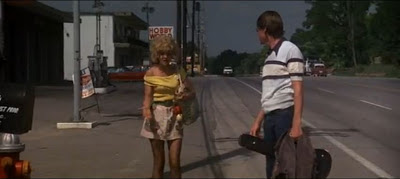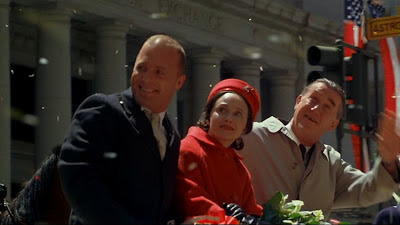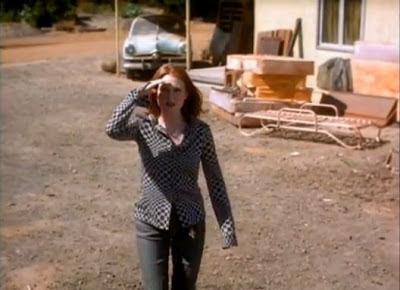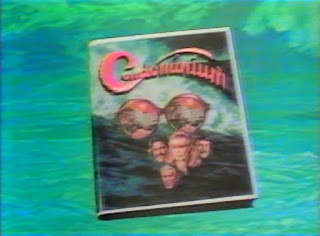By 1980, the disaster genre that had started a decade earlier with "Airport" (1970) and "The Poseidon Adventure" (1972) had pretty much run its course. Irwin Allen foisted the bargain basement
"When Time Ran Out..." (1980) on disinterested moviegoers earlier that year and flopped. Universal's "Airport" series ended the year before with the excreable "The Concorde: Airport '79" (1979). However, later in 1980 the Operation Prime Time consortium of independent television stations quietly aired the thoroughly entertaining two-part TV movie "Condominium" (1980), a disaster-type melodrama based on John D. MacDonald's best selling novel of 1977. For once, the characters and storylines of the movie were actually engaging and interesting so that the audience wasn't impatiently waiting for the action and special effects to take place. In fact, the ultimate destruction of the titular condominium became the natural culmination of all the storylines, rather than standing as the sole
raison d'etre for the whole production.
"Condominium" was the story of the denizens of the stylish Silver Sands Condominium in the fictional Fiddler Key in Florida. As they deal with rising condo association fees and the interpersonal relationships and conflicts taking place within the building, a contingency of residents in the building become aware that Silver Sands has been constructed using substandard materials. Barbara Eden had one of her most underrated roles as the attractive Barbara Messenger, the much younger wife of wealthy retired industrialist Lee Messenger (Ralph Bellamy) who is dying of cancer. Barbara is attracted to hydraulics engineer Sam Harrison (Dan Haggerty), who is visiting his friend Gus Garver (Steve Forrest) while his wife Carolyn (Virginia Leith) is recovering from a stroke in the hospital. Sam is the one who first spots the cracks in the foundation of the building, and notices the poor materials and workmanship characterizing the construction of the building.

Sam works closely with his friend Gus, the Messengers, and retired government intelligence officer Henry Churchbridge (Richard Anderson) and his wealthy aristocratic Italian wife Carlotta (Linda Cristal) to try and make shady construction magnate Marty Liss (Stuart Whitman) pay for a seawall and other repairs that might help provide reinforcement for the building. The residents of Silver Sands do not realize that Marty Liss and his construction operation are a front to launder syndicate money and that construction of the condominium was the result of these endeavors. Liss cut corners on the construction of the building in order to pocket some of the budget for the construction costs for himself. Concerned at what the residents might dig up about him, Liss sends in his attractive associate Drusilla Byrne (Pamela Hensley) to live in the building and gather intel. Dru and Gus slowly become good friends and Gus finds himself attracted to her despite his loyalty to his ailing wife. Meanwhile, Sam and Barbara become close with the encouragement of the ailing Lee, who doesn't want Barbara left alone after he is gone. As they try to raise the consciousness of the other residents in the
building regarding the potential safety issues concerning the building,
they must eventually deal with the impending arrival of the deadly
Hurricane Ella, which threatens to make the potential safety issues in
the building a tangible reality.


"Condominium" works because director Sidney Hayers and screenwriter Steve Hayes create a vivid atmosphere in the movie, thanks to lively performances and characters, that makes Silver Sands feel like a real community. The location shooting at the Pinnacle Port condominium and resort in Panama City Beach, Florida, also contributes greatly to this atmosphere and helps create in the viewer a genuine feeling of how beautiful and idyllic living at Fiddler Key is for the condominium residents. When I saw "Condominium" on its first airing as a kid, I wanted to live at Silver Sands someday, especially if my neighbors were anywhere as interesting as the characters in this movie. In contrast to, say, "When Time Ran Out...," the characters in "Condominium" are not mere plot devices to help move the disaster storyline along, but vibrant and interesting people who would've held our attention even if there was no impending hurricane threatening the residents of Silver Sands. In addition to the characters I've already mentioned, there's also Don Galloway and Ana Alicia as an unhappily married couple Jack and Thelma Messenkott. Jack's a middle-aged man who married Thelma, a much younger woman who he thought would bring excitement into his life. Jack is frustrated that all Thelma wants to do is explore the nature and greenery surrounding the condominium rather than go play tennis with him. Little does Jack realize Thelma's emotionally fragile nature, which comes to fore when she has a nervous breakdown at witnessing the jungle next to Silver Sands being torn down by Marty Liss to build an identical structure. A very young Ana Alicia gets a chance to test run the sort of disarming vulnerability and passionate emotionalism that she later specialized in
while playing Melissa Agretti on "Falcon Crest."

Larry Bishop plays the building's smarmy and sleazy manager, Julian Higbee, married to beautiful Lorrie (Mimi Maynard), but having an affair with smart sassy nurse Bobbie Fish (Carlene Watkins). Lorrie and Bobbie both become fed up with Julian, and become good friends. They turn to each other for emotional comfort and support in a relationship that eventually turns into a surprisingly sympathetic and non-exploitative lesbian storyline that totally went over my 8 year old head when I saw this on its initial airing. Looking at it again decades later, I'm impressed at how "Condominium" treated Lorrie and Bobbie's relationship as nothing novel or unusual. The result is probably one of the most pure and sincere romantic storylines in the movie. There's a very sensitive scene later in the movie, as the residents are evacuating at the threat of the impending Hurricane Ella, where Lorrie and Bobbie discuss Lorrie leaving Julian once and for all and making a life for themselves just before Julian walks in on them. The previously meek Lorrie stands up to him and walks out on Julian for good. What makes it work is that both Lorrie and Bobbie are honest with each other about their fears and their uncertainty of being together, and Maynard and Watkins make it a believable moment that helps "Condominium" still look current and relevant in 2013.

Nedra Volz plays kind-hearted elderly resident Mrs. Conlaw, who is always telling Steve Forrest's Gus Garver, the head of the condominium association, of every little problem in the building. Despite her pickiness she is a very endearing character, not at all a nuisance, particularly in the scene when Gus is leaving to go visit his wife in the hospital. Mrs. Conlaw stops him at the elevator and he thinks she's going to ask him to take care of another issue in the building, when all she intended to do was to ask him to give his wife her best wishes and that they all miss her at the building. In one of the most delightful twists to "Condominium," we later learn that the kindly Mrs. Conlaw is actually the mother of Conlaw (Nehemiah Persoff), the ruthless Miami mobster that Marty Liss works for who financed the construction of Silver Sands to help launder his dirty money. (Throughout the movie, we see Mrs. Conlaw call her son from the payphone in the condominium parking lot. We assume that her son is probably as kind and mild-mannered as she is and are startled when we realize how sinister and powerful he really is.) When Conlaw learns that Marty Liss skimmed money from the construction budget for his personal gain, he is outraged particularly because his mother had been living in that building. Stuart Whitman does a great job at creating such a sleazy, unscrupulous character in Liss that even mobsters like Conlaw appear to have more common decency than he does.

Richard Anderson and Linda Cristal also do good work as a loving married couple Henry and Carlotta Churchbridge--he's a former CIA agent, she's a wealthy European aristocrat he married while working overseas--who still have much passion and affection for each other in their marriage. The stability of their characters help provide a sense of balance compared to that of their neighbors. As the Churchbridges are evacuating from Silver Sands, I like how Richard Anderson plays the scene where Henry takes one last look around his home and says
"I was just thinking, in spite of everything, we've had a pretty good life here" with an air of both realism and romanticism that shows how his character has the ability to take in all that is around him. Richard Anderson also has several good scenes with Ana Alicia's fragile Thelma, as Henry is the one resident at Silver Sands who also understands and appreciates Thelma's love of the natural environment surrounding the condominium. When the neighboring jungle is torn down to make way for Marty Liss's new Harbor Pointe condominium project, Henry is also the one character who recognizes how this will emotionally shatter the unstable Thelma. Thanks to the good work of all involved, you never get bored with any of the characters and storylines in "Condominium" the way you do with other late-period disaster movies.

Probably the most interesting storylines involve a pair of love triangles featuring the movie's most important characters. The first one involves Barbara Eden's character Barbara Messenger, who is married to Ralph Bellamy's wealthy Lee Messenger (an older man dying of cancer), but is attracted to Dan Haggerty's hydraulics engineer Sam Harrison. I like the fact that Barbara and Lee have a loving and honest marriage despite the age differences between them, and that Lee loves Barbara so much that he encourages her to work with Sam to investigate the structural issues with the condominium in the hopes that it will allow them to become close with one another. Lee wants to ensure that there will be someone who will be there for Barbara once he has passed away. This was the first thing I ever saw Ralph Bellamy in as a kid, and he was very likeable and appealing in ways that he was rarely allowed to be later in his career, where he often played villains in such things as "Rosemary's Baby" (1968) and "Nightmare in Badham County" (1976). I took to how kind and generous Lee's love for Barbara was that he wasn't the least bit possessive or jealous of Sam's presence--Lee has enough confidence to know that Barbara sincerely loves him that he is secure in encouraging his wife's blossoming friendship with Sam.

The underrated Barbara Eden has a better-than-average role for herself as Barbara Messenger, one that allowed her to go beyond playing what one assumes to be the stereotypical "Barbara Eden" type of character in a light and cheery mode. Instead, the role of Barbara Messenger allows Eden to play a serious individual with sincere concerns and hopes for herself who has already endured some genuine tragedies in her life. Eden has always been a fine, subtle actress who made the most of every opportunity presented to her. However, I sometimes think she is taken for granted by people who assume real acting involves changing ones attitude and appearance for every role they play as opposed to just being real. Eden's strength is that she convincingly plays believable human beings, not archetypal "characters." However, "Condominium" stands out because it allows Eden more interesting material to work with. At one point Barbara reveals to Sam that she was once married with a daughter, but that her family was killed in a house fire. She took a job working for Lee and, when he learned of her tragedy, he put her to work and kept her busy so that she didn't have time to feel sorry for herself. In the process, Barbara and Lee sincerely fell in love with each other and she is genuinely concerned with his comfort and well-being. Eden has a grown up role that allows her to go beyond just being cute and charming and the result is one of her better post "I Dream of Jeannie" TV movies. Eden brings a lot of compassion and intelligence to the role that allows the viewer to understand the sort of hurt and grief that Barbara Messenger has experienced in her past. Because of the sensitivity and depth she brings to the role, Eden makes Barbara Messenger a very human and realistic individual. Eden and Ralph Bellamy are excellent in their scenes together, giving Barbara and Lee Messenger a quick-witted chemistry that makes their marriage completely believable despite their age difference. Meanwhile, Eden and Dan Haggerty don't exactly have exciting or believable chemistry together, but they seem comfortable and at-ease around each other that you are able to sense, at the very least, a sincere platonic friendship developing between them that is touching and appealing.

The other love triangle involves Steve Forrest's Gus Garver, his ailing wife Carolyn, and Pamela Hensley's sexy Dru Byrne. Dru is sent by Marty Liss on a reconnaissance mission to live in the building, befriend Gus Garver, and spy on the condo residents so that she can report back to Liss what the association of owners might be planning against him in terms of their dissatisfaction with the rising maintenance fees and unsatisfactory management of the building. In the process, Dru and Gus become genuine friends and eventually become attracted to each other. When Dru learns about Gus and Sam's report that Silver Sands is a potential death-trap, she humbly tells the condo owners, when they kick her out of their owner's association meeting,
"I would just like to say one thing, if I may. Silver Sands may or may not be safe. I really don't know. But, had I known it was unsafe, I would never have sold one single solitary unit. And that's the God's honest truth." Later, Dru urges Marty Liss to bring in Sam Harrison or another engineer to devise sea walls or implement repairs to the building to fortify it against a hurricane. When he refuses, she quits her job, but not before informing him that
"Look, I've done my share of the dirty work, too, if that's what you mean...True, I won't deny that money is very high on my list. But there are limits, Marty."
In the best scene of the movie, Dru comes clean to Gus, while they are having drinks at a bar, about Marty Liss's connection to the mob and how Silver Sands was constructed in order to launder Syndicate money in legitimate business operations. When Gus asks Dru whether she was aware of all of this she humbly responds,
"Did I work for the mob, you mean? Well, I worked for Marty. And I certainly knew where my salary was coming from. Sorry about that, Darlin'. I wish it weren't true. But today isn't my day for lying. Anyway, I'm through with all that now. That's why I'm telling you all this to rinse out my conscience so to speak." As Gus tells Dru that he is happy she is no longer associated with him, Dru says
"I was hoping you'd say that...Don't you know why? You can mean a lot to me. A whole lot. And I guess what I'm hoping for more than anything right now is if there's a possibility we could..." Gus cuts her off before Dru is able to finish her statement and she realizes that he does not intend to become romantically involved with her even though he cares for her very much. Hensley does an excellent job in this scene projecting Dru's hurt, embarrassment and disappointment at being rejected by Gus.
As an awkward silence sets in between them, she slowly lifts her glass of wine, sips from it, sets it down and stares at her glass, trying to keep busy in order to save face and cover up her feelings for Gus. When Dru says that she plans to move out of the building and stay with a friend in Fort Lauderdale, Gus comments
"It's a nice place." Dru bravely and defiantly says
"They're all nice places, Gus darlin', when you're with the right person. You take care. You know, your wife is a lucky lady" before she kisses Gus on the cheek and walks out of his life forever. I always remember feeling sad for both Dru and Gus in this scene as they realize that their friendship, which meant a lot to them, has now come to an end. Dru turns out to be the most interesting character in "Condominium," a woman with a level of corruptibility and shadiness attached to her, but who is attracted to the purity and decency of Gus' soul and ultimately proves to be a decent person herself when she quits working for Marty after learning of the dangerous structural issues with Silver Sands.


Later on, "Condominium" strongly suggests that Dru perished in the Hurricane, as she allows herself to be seduced by building contractor Cole Kimber (Jack Jones) in his motor home while he is helping her move out of the building. Dru and Cole ignore the warning signs of the storm raging around them as she gives in to the advances of Kimber, an associate of Liss's that she always found repulsive. You don't actually see them perish, but since the movie never gives you a scene which shows Dru has safely evacuated to the mainland, you ultimately have to conclude that her character did not survive. I always felt that Dru intentionally did this on purpose because of her guilt over helping Marty construct the building, as well as her sadness at losing Gus. She was in-essence punishing herself, to further
"rinse out her conscience," by ignoring the hurricane warnings and allowing herself to drown at the end. However, "Condominium" spares us an undignified death scene for the ultimately sympathetic Dru. She might be punishing herself, but the movie doesn't punish her any further by exploiting her death on-screen as other disaster movies might have done for their morally complex characters.

I was so wrapped up in the storylines of "Condominium" that I patiently awaited the arrival of the deadly Hurricane Ella, which threatens to topple the building. As the storm approaches, most of the residents vacate to the mainland for safety, while some residents stay behind and throw a hurricane party. For once, the foolishness of some characters in a disaster movie to stay behind as the danger approaches makes sense, instead of standing as a phony and lazy plot contrivance. The residents of Silver Sands are mostly retirees on fixed incomes. It would be difficult for them to pack and move without a financial safety net to allow them to land elsewhere. Even though we know they are making the wrong decisions for themselves, it is not without reason. Unlike most TV shows or movies these days, "Condominium" acknowledges and explores the financial concerns of middle-aged and elderly retirees. When Gus tries to convince the residents at a community meeting, who are skeptical of the results of Sam's survey, that their lives are at stake and that life is more important than money, resident Audrey Ames (Elinor Donahue) reminds Gus from the audience,
"When people are living on a fixed income, Mr. Garver, life is money." In so doing, the movie has a depth and subtext that allows it to rise above disaster movie cliches.
What I like about "Condominium" is the fact that we care about the people in the story and that the action and special effects of the final act have been carefully integrated into the story rather than standing alone as the main centerpiece for the film. "Condominium" does such a good job balancing all these characters and stories it even has time to provide a wrap up to a minor storyline involving obnoxious loudmouth condominium resident Frank Branhammer (Bill Zuckert), an overbearing bully who usually intimidates his meek wife Doris (Lyndel Stuart). As the Branhammers attend the foolish hurricane party, Frank yells at Doris and tells her to shut up when she expresses fears about the hurricane. The sympathetic Doris finally has the strength and resolve to stand up to her husband and tells him
"Goodbye, Frank...I mean, I'm leaving. Right now. You I can take. You plus the hurricane is just too much...See you around, Frank, if you can swim that is" as she walks out on her husband and presumably evacuates safely to the mainland while her husband is left to perish due to his own arrogance and folly. It's a completely satisfying ending to a minor storyline in the movie. (However, as obnoxious as Branhammer is, he seems genuinely surprised and hurt when Doris walks out on him. Moreover, even someone as gentle as Thelma Messenkott finds redeeming qualities in Branhammer when she defends him to her disdainful husband Jack during a condo association meeting. Thelma tells Jack
"It's only because he feels out of place here" that Branhammer is as loud and belligerent as he is. In so doing, "Condominium" demonstrates how fair-minded it is about
all of its characters.)
At the end of "Condominium," when Hurricane Ella becomes powerful enough to generate a tidal wave that hits Fiddler Key and Silver Sands, and causes the building to crumble into the ocean, there is a bit of sadness because the building that linked together such interesting characters and stories has now been destroyed. A few critics at the time, who called "Condominium" a piece of "trash TV" (decades before reality shows taught us the true definition of that phrase), criticized the special effects at the end of "Condominium" as being substandard in its depiction of the destruction of Silver Sands, but I completely disagree. Unlike Irwin Allen's "When Time Ran Out..." (which botched the ultimate destruction of the resort complex in that movie by having
a cheesy bit of animation, purportedly depicting a volcanic fireball, envelope a wide shot of that building), the miniatures used at the end of "Condominium" to depict the destruction of Silver Sands are actually quite detailed and impressive, especially by 1980 television standards. As the building collapses, you realize that these lively and engaging characters, who once lived here together and made Silver Sands an interesting place to live, will now be scattered to the winds as they begin to forge new lives for themselves elsewhere. Unlike the characters in other disaster movies, who you forget about once the credits roll, you actually wonder what will happen next to the characters of "Condominium" as the surviving, former residents of Silver Sands continue to live with the after-effects of Hurricane Ella in their lives.



































































